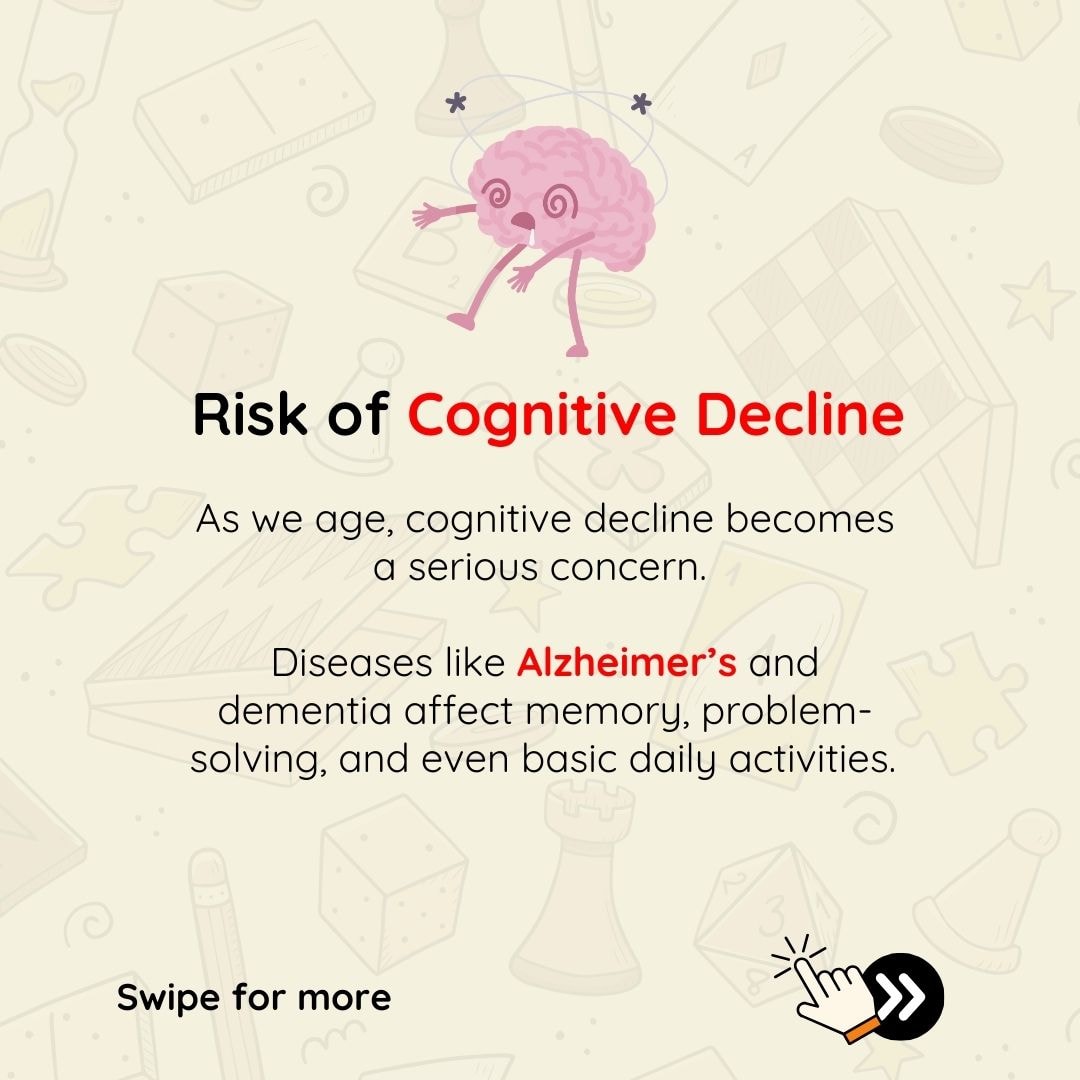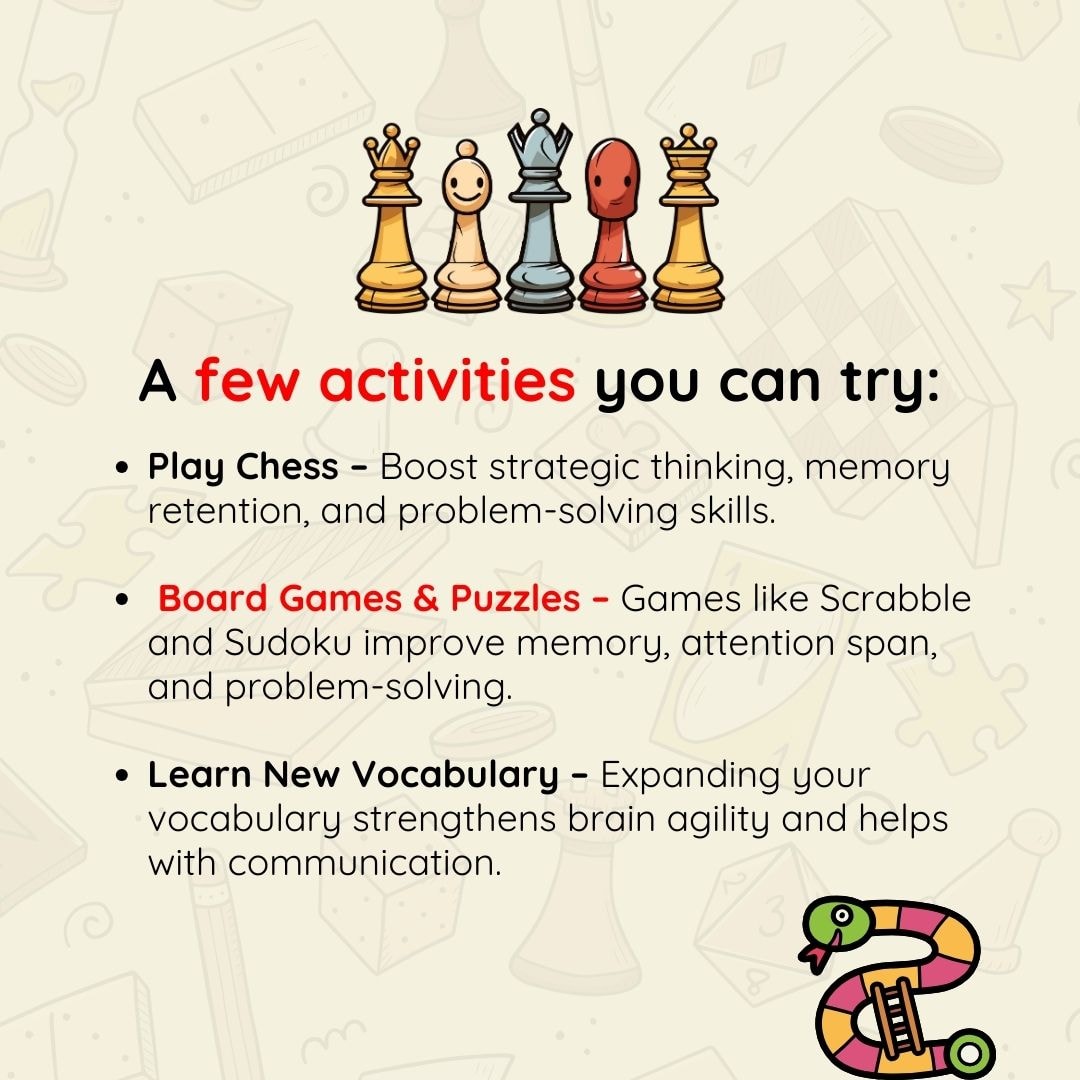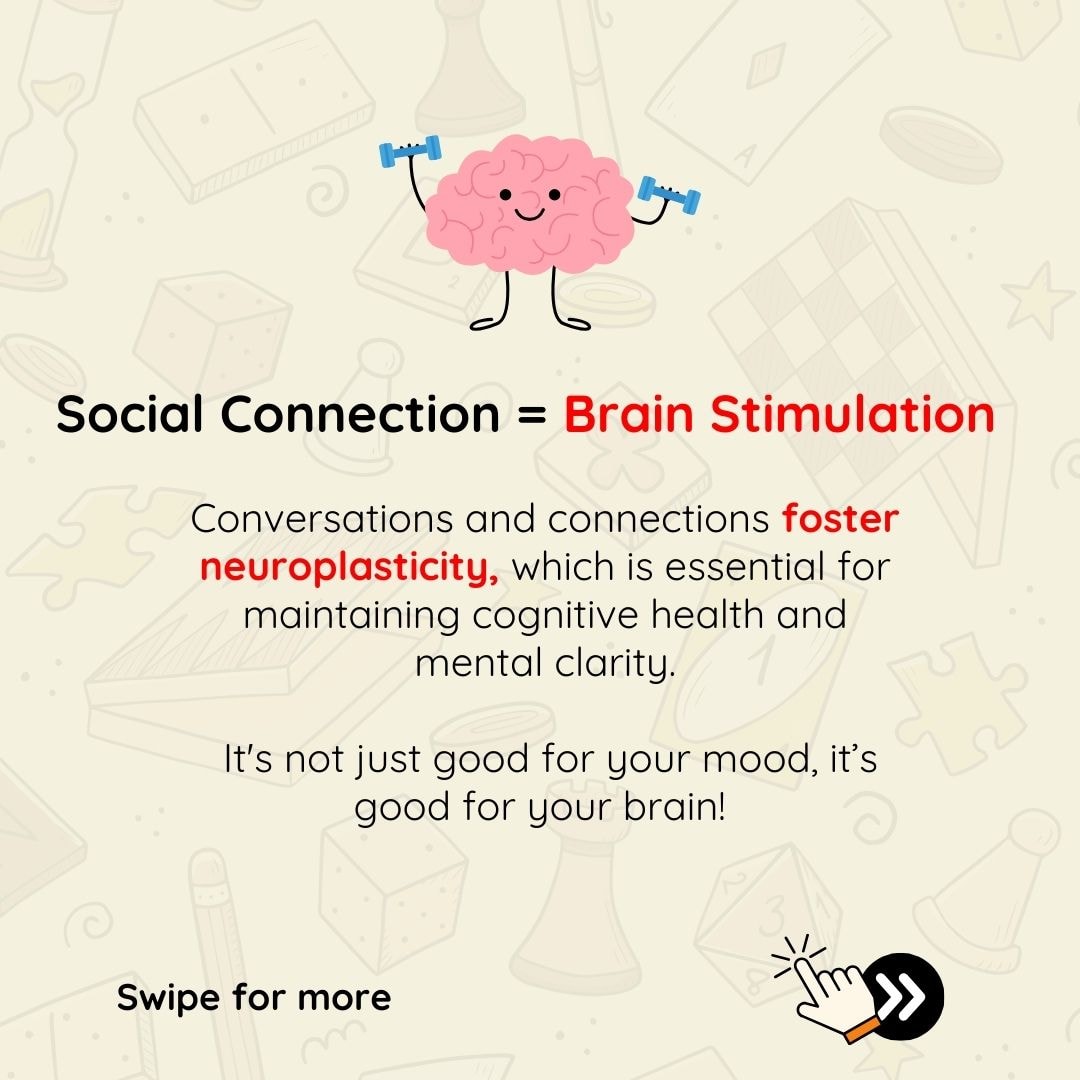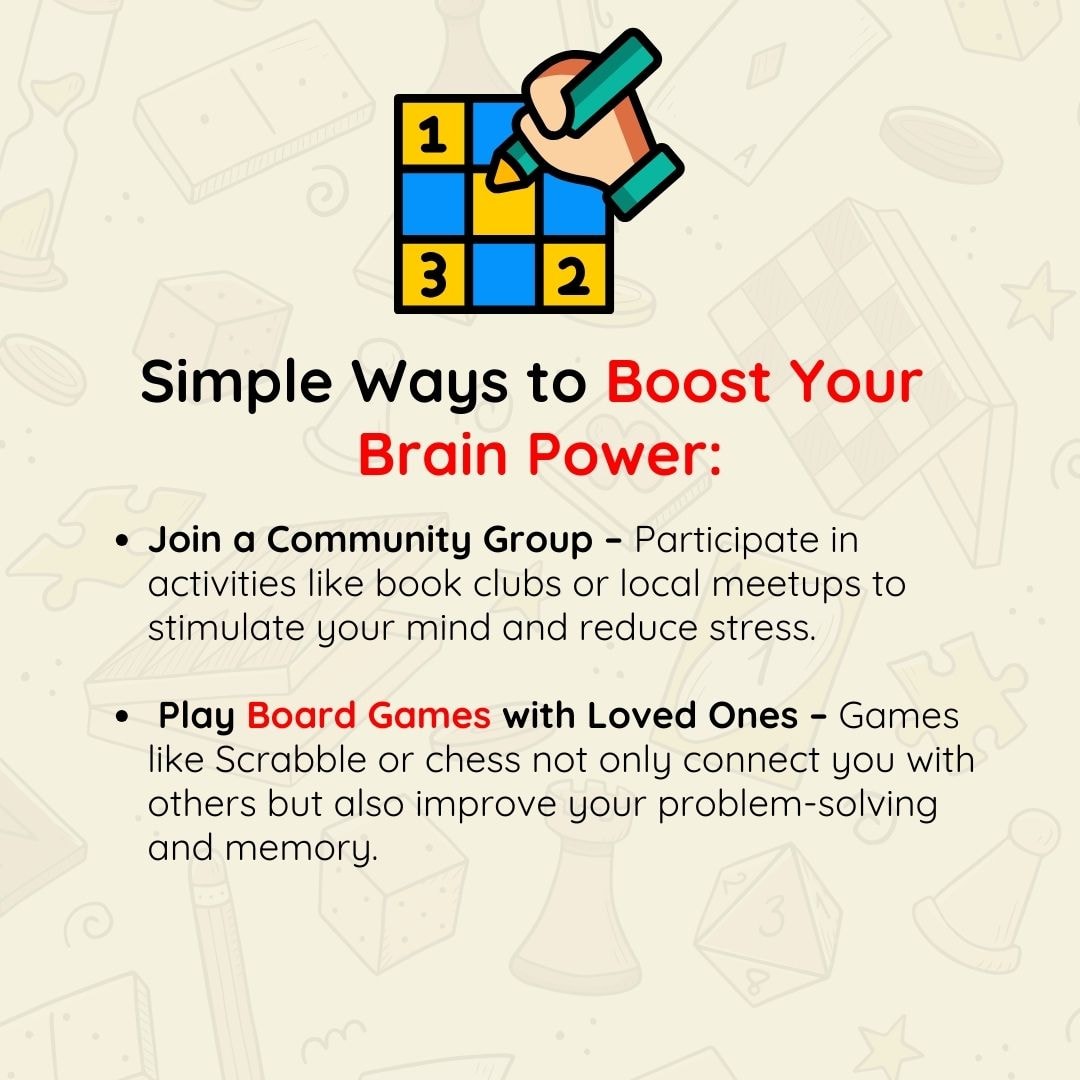How to Keep Your Brain Young and Agile with Everyday Activities: 5 Simple Tips
Zeba ParkarShare
Do you ever walk into a room and completely blank out on why you're there? Or have trouble recalling a name even though it was on the tip of your tongue? These little memory lapses—commonly referred to as senior moments—can occur at any age. But as we age, it is increasingly crucial that we do everything we can to keep our brains young and mentally sharp.
The brain, being any other muscle, requires constant exercise to remain strong. Though we cannot prevent aging, we can definitely delay cognitive deterioration by integrating simple, day-to-day practices into our lives. According to research, participating in activities that stimulate brain cells, enhance neural connections, and promote mental exercises can drastically reduce the risk of Alzheimer's disease and mild cognitive impairment.
In this blog, we’ll explore five effective ways to enhance brain health and improve your brain’s ability to stay sharp. Whether it’s through physical exercise, learning a new language, playing board games, or making small changes to your daily routine, these simple activities can have a positive impact on your overall mental well-being.
1. Stay Physically Active to Enhance Mental Agility
Why Physical Health is Essential for Brain Health
Physical and brain health are very much related. Regular physical activity does not only do good for the body, but it also does a lot of good for brain health. When you exercise, the brain gets better blood flow, which is good for the brain cells getting oxygen and necessary nutrients. This better blood flow encourages the growth of new brain cells, which maximizes cognitive function. Exercise also lowers high blood pressure, a risk factor for cognitive decline, and aids in reducing stress, which is essential for preserving mental well-being.
In addition, exercise triggers the release of endorphins, the brain's "feel-good" hormones, which improve mood, decrease anxiety, and give a person a positive attitude. These are key to remaining quick-witted and mentally sharp since long-term stress can have damaging effects on brain function. Keeping your body in motion is, therefore, one of the surest ways of keeping your brain healthy for decades to come.
Best Exercises to Keep Your Brain Active
To keep your brain engaged, it's essential to incorporate physical activities into your routine. Here are a few exercises that offer great benefits for mental agility:
- Walking and Tai Chi are both low-impact exercises that improve balance, coordination, and mental clarity. Studies have shown that Tai Chi, in particular, enhances neural connections and helps with cognitive function. Whether you’re walking around your neighborhood or practicing Tai Chi, these exercises promote a calm and focused mind, helping to enhance mental well-being.
- Incorporating strength training into your routine by lifting weights or doing bodyweight exercises not only builds muscle but also strengthens the brain. Research suggests that strength training can enhance memory and improve cognitive function by increasing blood flow to the brain, promoting the growth of new brain cells.
- Cardiovascular exercises like running, cycling, or swimming boost blood circulation, ensuring that your brain receives a steady supply of oxygen and nutrients. These activities are key to promoting brain health and have been shown to increase mental agility, problem-solving skills, and overall cognitive function.
2. Engage in Mental Workouts to Strengthen Cognitive Abilities
Why Mental Workouts Are Crucial for Brain Health
Your brain, like your body, requires periodic exercise to stay healthy and quick. While physical exercise is typically cited for ensuring bodily health, mental exercises are also necessary to keep the brain healthy and enhance it. The brain is an extremely flexible organ with the ability to create new connections between the nerve cells in one's lifetime—a process called neuroplasticity.
When you tackle difficult mental tasks, whether it's solving a puzzle, acquiring a new skill, or playing strategic games, you actually foster the creation of these new pathways, directly enhancing your cognitive faculties. This can have a deep impact on your intellectual acuity, enhancing your problem-solving abilities, enhancing memory recall, and even lowering the risk of intellectual deterioration.

Studies have shown that engaging in regular mental workouts helps to delay or even prevent the onset of mild cognitive impairment (MCI) and diseases such as Alzheimer’s disease and dementia. In fact, research indicates that the more you challenge your brain, the better its ability to ward off age-related mental decline. By maintaining an active mind, you can keep your brain healthy and prevent the inevitable slowing down that often comes with age.
Best Activities to Boost Mental Agility
Here are some of the best mental workouts you can engage in to strengthen cognitive abilities and maintain a healthy brain:

1. Play Chess
Chess is often referred to as the ultimate mental workout. It’s a game that requires deep concentration, strategy, and forward-thinking. Every move forces players to use their brain cells to analyze the situation, anticipate their opponent's next moves, and develop a winning strategy. The game is known to enhance problem-solving skills, increase memory retention, and improve logical reasoning.
For older adults, playing chess can have a positive impact on brain function, reducing the risk of Alzheimer’s disease and cognitive decline. It’s also a great way to boost mental agility—the brain’s ability to switch between tasks and concepts easily and efficiently. So, if you’re looking for a fun yet effective way to keep your brain active, chess is a fantastic choice.
2. Board Games and Puzzles
Another great way to improve mental health and keep your mind sharp is by playing board games. Games such as Scrabble, Sudoku, and memory-based puzzles like Trailblazers can provide excellent exercise for your brain. Board games offer multiple benefits:
- Memory: Memory games can help improve both short-term and long-term memory, keeping your brain healthy and sharp.
- Problem-Solving: Strategy games encourage critical thinking and force players to use their brains to navigate complex problems.
- Attention Span: Board games require focus and concentration, which can improve your attention span over time.
Not only do board games offer cognitive benefits, but they also provide an opportunity for social interaction, which is a vital component of mental well-being. Loneliness and isolation have been linked to a higher risk of cognitive decline, so playing board games with friends or family can also enhance social engagement.
3. Learn New Vocabulary Words
One of the easiest and most enjoyable ways to exercise your brain is by expanding your vocabulary. Learning new words engages the language centers of your brain, improving neural connections and enhancing memory. You can start by reading books, articles, or even using apps designed to introduce new words. The process of learning new vocabulary is like giving your brain a workout—it keeps it agile and brain-healthy.
Expanding your vocabulary isn’t just about learning new words—it’s about strengthening your brain’s mental agility and increasing your ability to understand complex concepts. A larger vocabulary allows you to communicate more effectively, which can benefit both your personal and professional life.
Before we dive into tip number 3, let's first discuss how board games enhance brain function.
How Board Games Improve Brain Function
One of the best ways to keep your brain young and agile is by engaging in board games. Whether you’re playing a classic game like Scrabble or solving complex puzzles, board games encourage a variety of cognitive skills that support overall brain health.
Here’s how board games promote mental well-being:
- Boost Problem-Solving Skills: Board games often require players to make decisions based on strategy and logic, encouraging critical thinking and problem-solving. This helps improve mental agility.
- Encourage Logical Reasoning: Strategy-based games like Risk or Settlers of Catan require logical thinking and the ability to anticipate various outcomes. This strengthens decision-making abilities and enhances mental clarity.
- Strengthen Focus and Attention Span: Since many games require players to focus on the task at hand, they can help improve concentration over time. Staying engaged in the game can also help reduce the risk of brain fog and mental fatigue.
-
Promote Social Engagement: Playing board games with family or friends can reduce isolation, which has been shown to increase the risk of cognitive decline. Social interaction helps keep the mind sharp and supports overall mental health.
You can explore ToadBird’s exciting collection of board games and boost your brain power while having fun!
3. Learn Something New to Strengthen Brain Function
Why Lifelong Learning is Key to a Healthy Brain
The brain feeds on novelty. It delights in learning something new, like a new language, musical instrument, or sport. These activities stimulate the brain and stimulate neuroplasticity—neural connections that the brain develops. These are important activities for brain maintenance to keep you from developing mild cognitive impairment and other age-related conditions, as well as from losing your mental acuity as you get older. Lifelong learning keeps your brain healthy and active.
It is proved through research that constant brain stimulation can ward off diseases such as Alzheimer's disease and dementia, as it aids the brain in creating new brain cells, thus ensuring general mental well-being.
Effective Learning Activities
Here are a few great ways to challenge your brain through learning:
1. Learn a New Language
Learning a new language is one of the best things for your brain. Studies have shown that bilingual individuals tend to have better cognitive flexibility and are at a lower risk of mild cognitive impairment. The act of learning new vocabulary words and grammar structures strengthens neural connections and improves memory retention.
2. Pick Up a Musical Instrument
Learning an instrument enhances memory, coordination, and focus. Whether it’s the piano, guitar, or any other instrument, it challenges multiple areas of the brain, improving cognitive abilities and maintaining brain health as you age.
3. Try a New Sport
Participating in a new sport, like tennis or dancing, improves cognitive function by enhancing coordination and mental focus. Sports that require physical activity are also great for physical health, which in turn supports mental well-being. Exercise improves blood flow to the brain, promoting the growth of new brain cells.
4. Prioritize Sleep, Nutrition, and Stress Management for Brain Health
How Sleep Impacts Brain Function
Sleep deprivation can seriously affect cognitive abilities, resulting in memory loss, inability to concentrate, and even mood swings. While asleep, the brain solidifies memories, flushes out toxins, and reinforces neural connections.
Eating a Brain-Healthy Diet
What you eat plays a crucial role in brain health. A diet rich in healthy fats, antioxidants, and essential nutrients can slow cognitive decline and protect against Alzheimer’s disease.
- Omega-3 Fatty Acids – Found in fish, nuts, and seeds, these support brain cells and cognitive function.
- Antioxidants – Berries, dark chocolate, and green tea protect the brain from oxidative stress.
- Leafy Greens – Spinach, kale, and broccoli are excellent for maintaining cognitive function.
Managing Stress to Keep Your Mind Sharp
Chronic stress negatively impacts memory, concentration, and mental well-being. Techniques like meditation, mindfulness, and allowing your mind to wander in creative activities can significantly improve brain health.
5. Stay Socially Connected to Maintain Mental Agility
Why Social Engagement is Essential for Brain Health
Staying socially active plays a critical role in reducing cognitive decline. Regular conversations and meaningful interactions encourage brain stimulation and enhance mental agility.

Ways to Stay Socially Engaged

- Join a Community Group – Engaging in social activities stimulates the brain and reduces stress.
- Have Thought-Provoking Conversations – Discussing different viewpoints encourages critical thinking.
- Play Board Games with Friends and Family – A great way to develop problem-solving skills while staying socially connected.
- The Connection Between Emotional Well-Being and Cognitive Function
Emotional well-being directly affects brain health. Positive social interactions encourage the release of oxytocin and dopamine, chemicals that enhance mood and reduce stress. The more socially engaged you are, the stronger your cognitive abilities remain.
Conclusion
Maintaining mental agility and keeping your brain young doesn’t require drastic changes. By incorporating simple, everyday activities like physical exercise, playing board games, learning new skills, and prioritizing sleep and nutrition, you can significantly enhance your brain health.
To recap:
- Stay physically active to increase blood flow and prevent cognitive decline.
- Challenge your brain with mental workouts like chess and memory games.
- Learn something new to strengthen neural connections.
- Take care of your sleep, diet, and stress levels for a healthy brain.
- Stay socially engaged to improve overall mental well-being.
By making these small but impactful changes, you can keep your brain sharp and enjoy a lifetime of cognitive vitality.